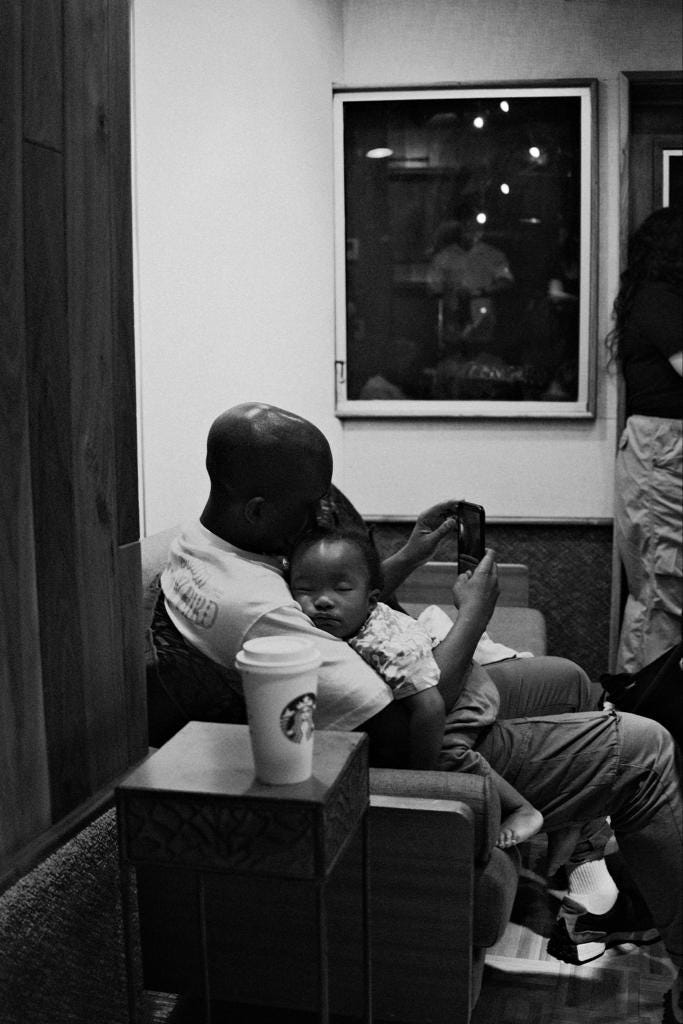don't compete with your spouse.
Effort may look different but doesn’t make it less significant.
Summer, plus two kids (both under five — one still requires twenty-four surveillance services, two uninterrupted naps accompanied by improvised baby shark sing-alongs and regular nappy changes). This is still no excuse for my two week hiatus.
In fact, due to an ESTA confusion (no thanks to US customs), the airline forced my wife to fly without us. This means I survived a five-hour wait for the next flight and then a 10-hour trip to LA with two kids (one kid and one baby). Now I feel unstoppable. What is a newsletter when you can change nappies at high altitudes while explaining to your five-year-old the laws of gravity, flight propulsion, and a question about the universe every five seconds?
The newsletter has not been newslettering recently, and I accept full responsibility. On a bright note, I am currently in LA with the family, and the jet-lag, sun, and irresponsibly large amounts of fast food put the kids to bed with enough time for me to guilt-trip myself back into writing.
The flight experience inspired an interesting stream of consciousness. The concept of competition in a marriage or relationship is something that happens unintentionally. We keep score against our spouse (especially when you have kids) forgetting that we are both attempting to win the same game.
Speaking to my wife a few months ago, I mentioned that I felt like she plays a game of tit for tat in our relationship. Not in a competitive, 'I want to beat you' kind of way, but more in the manner of 'it’s your turn now' or 'I owe you one.' Many spouses keep track of their 'contributions' to a relationship and then feel cheated when the 'effort' is not reciprocated in the same way. It’s important to understand that effort is about equality and not sameness. Effort may look different but doesn’t make it less significant. One spouse might get the car cleaned, another might put petrol in it. If you keep track of how many times you paid for petrol and refuse to pay anymore until the person pays the equivalent amount, what happens? The vehicle never gets moving.
After 11 hours on a plane with the kids, did I feel entitled to some free time when we landed? Of course I did. Yet, my wife needed to participate in a panel on the day we arrived, meaning more parenting overtime for me. It’s a struggle to see what equality looks like, especially because it fluctuates. The scales rarely even up in a marriage; they shift back and forth, but true balance doesn’t come from maintaining the status quo; it is achieved by ensuring the scale doesn’t tip over.
Sometimes a week can go by with the scoreboard looking lopsided, but the goal is not to win just one game or one week, it’s to win the season or championship.
Define the objectives of your marriage; when a clear goal is in sight, the hurdles become manageable. My wife’s first job created frustration early in our relationship. The job wasn’t the problem; a highly paid corporate finance job is any graduate's dream. Still, it lacked direction and the upward mobility my wife deserved. She worked the hamster wheel tirelessly with no idea when or how she could achieve her goals. When we couldn’t do things as a couple because of her job, it felt like wasting opportunities for no reason. I told her that I didn’t mind helping her commit to late shifts or putting dates on hold, but it needed to fit into our long-term objectives as a family.
Once she understood her direction and long-term objectives, she didn’t hesitate to take a 4-month sabbatical for us to travel the world together and help grow my career. An opportunity led her to her current career, in a role she loves, working for arguably the biggest company of the last decade. There is no such thing as ‘self-sacrifice’ when you define how your commitments help a family move toward its goals; it becomes ‘mutual-sacrifice.’
The game of marriage is like an endless tennis match, a back and forth struggle between love, commitment, and time. It’s a game that doesn’t always reward effort, and we don’t always make the right play, but I believe lessons learned through the process have (sometimes even more) value than the overall outcome. The ability to remember that you are a team, especially on a crowded flight wedged between a tired baby (who won’t sleep) and a five-year-old with an aversion to plane food, is all part of the win, even if you don’t see the results until much later. A spouse is not a competitor; they are a teammate.





Agree with everything written. The thing I feel like adding is maybe only relevant for me, but...
I feel part of the score keeping game is assuming we have the same needs is a loser's game. There are things I do which cost me, in my own mind, nothing, yet my wife feels guilt. And the reverse is true. How can you keep score when points are counted so differently. Costco with my kids is fun, for me. My wife hates it. Yard work with no kids is awful for me, my wife loves it.
Not only is it a losing battle to "keep score." Of course it is. But also, how does one keep score when the rules are not the same for all players.
Thanks for writing.
New on here but married for close to 10years and I’m happy I’m learning more and more from the write ups even with all my not so great experiences, if only i learned aome of this sooner